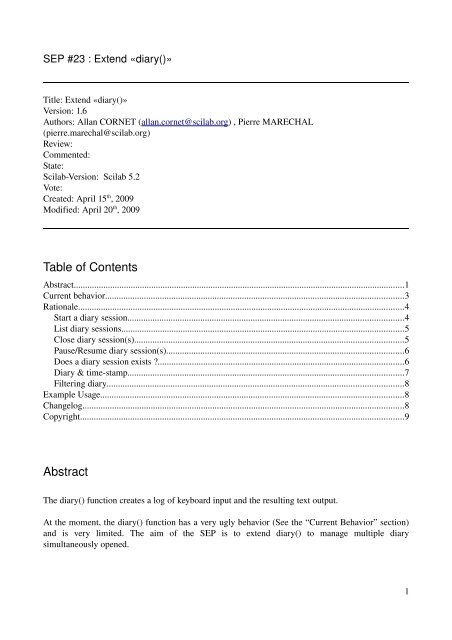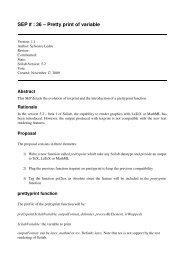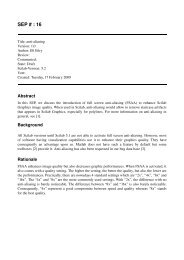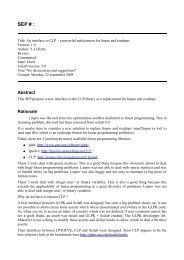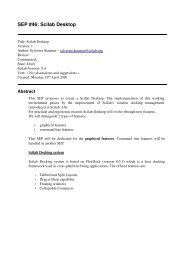Table of Contents Abstract - Scilab
Table of Contents Abstract - Scilab
Table of Contents Abstract - Scilab
You also want an ePaper? Increase the reach of your titles
YUMPU automatically turns print PDFs into web optimized ePapers that Google loves.
SEP #23 : Extend «diary()»<br />
Title: Extend «diary()»<br />
Version: 1.6<br />
Authors: Allan CORNET (allan.cornet@scilab.org) , Pierre MARECHAL<br />
(pierre.marechal@scilab.org)<br />
Review:<br />
Commented:<br />
State:<br />
<strong>Scilab</strong>Version: <strong>Scilab</strong> 5.2<br />
Vote:<br />
Created: April 15 th , 2009<br />
Modified: April 20 th , 2009<br />
<strong>Table</strong> <strong>of</strong> <strong>Contents</strong><br />
<strong>Abstract</strong>.................................................................................................................................................1<br />
Current behavior...................................................................................................................................3<br />
Rationale...............................................................................................................................................4<br />
Start a diary session.........................................................................................................................4<br />
List diary sessions............................................................................................................................5<br />
Close diary session(s)......................................................................................................................5<br />
Pause/Resume diary session(s)........................................................................................................6<br />
Does a diary session exists ?............................................................................................................6<br />
Diary & timestamp.........................................................................................................................7<br />
Filtering diary..................................................................................................................................8<br />
Example Usage.....................................................................................................................................8<br />
Changelog.............................................................................................................................................8<br />
Copyright..............................................................................................................................................9<br />
<strong>Abstract</strong><br />
The diary() function creates a log <strong>of</strong> keyboard input and the resulting text output.<br />
At the moment, the diary() function has a very ugly behavior (See the “Current Behavior” section)<br />
and is very limited. The aim <strong>of</strong> the SEP is to extend diary() to manage multiple diary<br />
simultaneously opened.<br />
1
Current behavior<br />
diary(filename)<br />
opens the file which path is given in f and register all subsequent <strong>Scilab</strong> console<br />
inputs and outputs.<br />
diary(0)<br />
Closes the current diary<br />
A 2 nd diary(filename)<br />
Closes the current diary and opens another one.<br />
This syntax has two drawbacks :<br />
Only one diary can be open at once<br />
If a diary is opened, a new call to diary closes the first one without warning or error.<br />
The first diary can be opened without the user know, for example, inside a toolbox<br />
function, this make the function shaky.<br />
2
Rationale<br />
Start a diary session<br />
[id,fileout] = diary(filename,[“new”|”append”])<br />
Returns :<br />
– id : a positive integer (>= 1) which is the diary session identifier.<br />
– fileout : A string, the absolute path <strong>of</strong> the effective written file ()<br />
The first input argument is a string that contain the path <strong>of</strong> the diary file. This can be a<br />
relative path or a absolute path.<br />
The 2 nd input argument controls if a new file is created (“new”) or if diary() adds new<br />
content at the end <strong>of</strong> the file (“append”). If the 2 nd input argument is not present, the<br />
default value is “new”<br />
If the file stated as 1 st input argument is already opened in <strong>Scilab</strong>, diary() returns an<br />
error.<br />
When diary() is called with “new” mode : If “filename” already exists and is not<br />
empty, an effective filename “base(filemane)+_#+extension(filename)”<br />
is built, used, and returned by diary(filename) as a second output argument<br />
(beside id). The rank # would<br />
be set as the smallest integer for which the resultant filename does not yet<br />
exists.<br />
3
List diary sessions<br />
[ids, filenames] = diary()<br />
[ids, filenames] = diary([],”list”)<br />
Returns<br />
– a column vector <strong>of</strong> integer : identifiers list <strong>of</strong> opened diary sessions.<br />
– a column vector <strong>of</strong> strings : absolute paths <strong>of</strong> the files associated with opened<br />
diary sessions.<br />
Close diary session(s)<br />
diary([],”close”)<br />
diary(0)<br />
diary(filename,”close”)<br />
diary(id,”close”)<br />
– The first and second syntaxes close all opened diary sessions.<br />
– The third syntax closes diary session(s) identified by “filename“. If “filename” is<br />
a just a basename and several diary sessions have been opened with the same basename,<br />
it returns an error. For example :<br />
> diary(SCI+”/log.txt”);<br />
> diary(TMPDIR+”/log.txt”);<br />
> diary(“log.txt”,”close”)<br />
!error<br />
diary: Ambiguous value for input argument #1: give the<br />
absolute path or the diary session id instead.<br />
“filename” can be a single string or a character string array.<br />
– The fourth syntax closes the diary session identified by “id” which is a positive<br />
integer or a matrix <strong>of</strong> positive integers.<br />
Remark : diary(0) is retained as backwards compatibility<br />
4
Pause/Resume diary session(s)<br />
Diary([] ,”pause”|”<strong>of</strong>f”)<br />
diary(filename,”pause”|”<strong>of</strong>f”)<br />
diary(id ,”pause”|”<strong>of</strong>f”)<br />
– The first syntax suspends all opened diary sessions.<br />
– The second syntax suspend diary session(s) identified by “filename“.<br />
“filename” can be a single string or a character string array.<br />
– The third syntax suspend the diary session identified by “id” which is a positive<br />
integer or a matrix <strong>of</strong> positive integers.<br />
diary([] ,”resume”|”on”)<br />
diary(filename,”resume”|”on”)<br />
diary(id ,”resume”|”on”)<br />
– The first syntax resume all opened diary sessions.<br />
– The second syntax resume diary session(s) identified by “filename“.<br />
“filename” can be a single string or a character string array.<br />
– The third syntax resume the diary session identified by “id” which is a positive<br />
integer or a matrix <strong>of</strong> positive integers.<br />
Does a diary session exists ?<br />
diary(filename,”exists”)<br />
Return true if a diary session is currently opened with the file “filename”, if not false.<br />
“filename” can be a single string or a character string array.<br />
5
Diary & timestamp<br />
diary(filename,”open”,”prefix=Ymd His”) // default<br />
diary(filename,”open”,”prefix=U”) // Seconds since the Unix Epoch<br />
diary(filename,”open”, ..<br />
[ ”prefix=Ymd His” ; “prefixonlycommands” ] );<br />
Examples :<br />
20090419 10:15:00 >a = rand(3,3)<br />
20090419 10:15:01 ans =<br />
20090419 10:15:01<br />
20090419 10:15:01 0.2113249 0.3303271 0.8497452<br />
20090419 10:15:01 0.7560439 0.6653811 0.6857310<br />
20090419 10:15:01 0.0002211 0.6283918 0.8782165<br />
20090419 10:15:01<br />
20090419 10:15:09 >diary(0);<br />
1240215778 >a = rand(3,3)<br />
1240215779 ans =<br />
1240215779<br />
1240215779 0.2113249 0.3303271 0.8497452<br />
1240215779 0.7560439 0.6653811 0.6857310<br />
1240215779 0.0002211 0.6283918 0.8782165<br />
1240215779<br />
1240215788 >diary(0);<br />
20090419 10:15:00 >a = rand(3,3)<br />
ans =<br />
0.2113249 0.3303271 0.8497452<br />
0.7560439 0.6653811 0.6857310<br />
0.0002211 0.6283918 0.8782165<br />
20090419 10:15:09 >diary(0);<br />
6
Filtering diary<br />
diary(filename,”new”,”filter=command”)<br />
Log only the input commands.<br />
diary(filename,”new”,”filter=output”)<br />
Log only the text output.<br />
Example Usage<br />
d1 = diary(TMPDIR + “/diary1.txt”)<br />
d2 = diary(TMPDIR + “/diary2.txt”)<br />
// some <strong>Scilab</strong> instructions …<br />
// returns infos about opened diary<br />
[ids, filenames] = diary()<br />
// close diary d1<br />
diary(Diaryd1)<br />
// close diary d2<br />
diary(TMPDIR + “/diary2.txt”)<br />
// closes all diary<br />
diary([],”close”)<br />
Changelog<br />
7
1.0 – Allan CORNET – Initial version<br />
1.1 – Pierre MARECHAL – Current Behavior Section<br />
1.2 – Pierre MARECHAL – Add some syntaxes<br />
1.3 – Pierre MARECHAL – Play/Resume diary session(s)<br />
1.4 – Pierre MARECHAL – Diary & Timstamp (Thx to S. Gougeon for this<br />
idea)<br />
1.5 – Pierre MARECHAL – Conflict with already existing files (Thx to<br />
S. Gougeon for this idea)<br />
1.6 – Pierre MARECHAL – Filtering<br />
Copyright<br />
This document has been placed under the license CeCILLB.<br />
8


